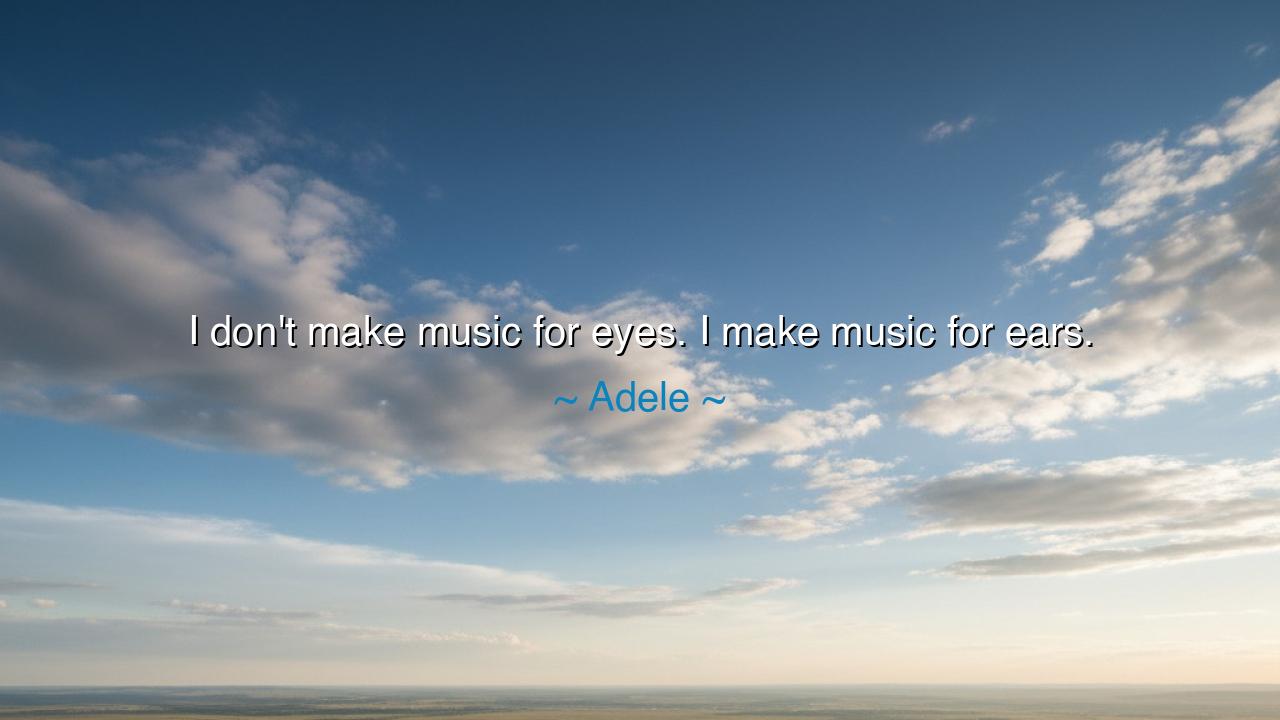
I don't make music for eyes. I make music for ears.






The words of Adele, "I don't make music for eyes. I make music for ears," are like a flame passed down through the ages, illuminating what is too often forgotten in our time. In this simple yet profound utterance lies a rebuke to vanity and a hymn to the eternal power of sound over appearance. For the eyes may deceive, seduced by glamour and surface, but the ears carry truth directly into the soul, bypassing the mask of outward form. Adele reminds us that music is not meant to be adorned for spectacle but to pierce the heart with its essence.
In the world of old, the bards and singers did not require stages dressed with golden lights, nor did they clothe themselves in riches to be heard. They stood with lyre or voice alone, and the people gathered not to see them but to feel the rising tremor of their words. Homer, blind yet immortal, recited verses that shaped the memory of Greece. His eyes may have been darkened, but his song shone brighter than any jewel. Here, as in Adele’s saying, the lesson resounds: greatness does not depend upon what is seen, but upon what is heard and felt.
In our present age, the eye reigns with tyranny. Images flood the world: faces curated, lives adorned for a fleeting gaze. Many seek fame by crafting how they appear, not what they create. Yet Adele, with her voice untethered to glamour, stood defiant. Her words recall the wisdom of ancient philosophers who taught that substance must outlive surface. Just as marble crumbles, so too does beauty fade; but a song, carried in the ears of generations, can endure beyond kingdoms.
Consider the tale of Beethoven, whose ears betrayed him with silence even as his genius burned brighter. Unable to hear with the senses, he still composed music that roared with thunder and whispered with tenderness. His works reached beyond what his own ears could perceive. Here lies a paradox, and a truth: the ear of the heart is greater than the eye of the body. What is true in art is also true in life—our worth is not in what is displayed but in what is shared, spoken, and given to others.
Thus, Adele’s saying is not merely about her craft; it is a challenge to all. She calls us to create for truth and not for applause, to build not for ornament but for essence. What matters most is not whether the world sees us adorned, but whether the world is moved by what we have planted within it. The wind cannot be seen, yet it bends the trees and shakes the seas; so too the unseen gift of the voice, the heart, the spirit.
For the young who hear these words, let them be as a compass: pursue not the shallow gleam of the eyes, but the deep resonance of the ears. Do not waste life curating how you are seen; instead, strengthen the voice of your soul, whatever form it takes. If you are a writer, let your words resound with honesty. If you are a friend, let your speech be kind and steadfast. If you are a maker of things, let your works carry weight that outlives the fashions of the moment.
The lesson is this: substance outlasts spectacle. What you craft in truth and offer in sincerity will outshine all illusions of surface beauty. Practical actions flow from this wisdom: speak with intention, create with depth, and do not be lured into building only what dazzles the eye. When tempted to value yourself by appearance, remember Adele’s voice. When urged to conform to the fleeting crowd, think instead of the enduring sound that enters ears and lodges in hearts.
And so, to those who walk after us, let these words ring: Do not seek to be seen; seek to be heard. For what the eye beholds is but a moment, but what the ear receives can echo forever.






AAdministratorAdministrator
Welcome, honored guests. Please leave a comment, we will respond soon